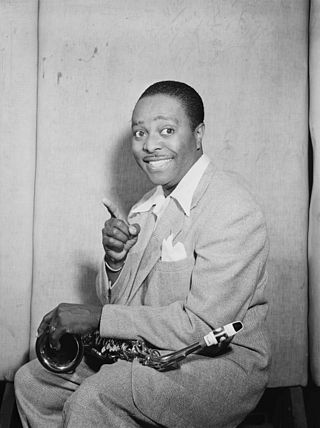
Louis Thomas Jordan was an American saxophonist, multi-instrumentalist, songwriter and bandleader who was popular from the late 1930s to the early 1950s. Known as "the King of the Jukebox", he earned his highest profile towards the end of the swing era. He was inducted into the Rock and Roll Hall of Fame as an "early influence" in 1987.

Thursday Night in San Francisco is a blues album by Albert King, recorded live in 1968 at the Fillmore Auditorium. This album, together with Wednesday Night in San Francisco, contains leftovers recorded live on the same dates as Live Wire/Blues Power. Thursday Night in San Francisco, released in 1990, contains material recorded on June 27, 1968.
"Saturday Night Fish Fry" is a jump blues song written by Louis Jordan and Ellis Lawrence Walsh, best known through the version recorded by Louis Jordan and His Tympany Five. The recording is considered to be one of the "excellent and commercially successful" examples of the jump blues genre.
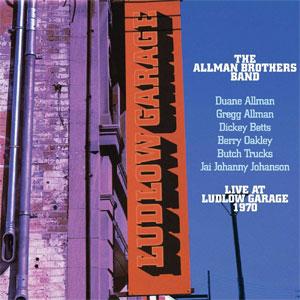
Live at Ludlow Garage: 1970 is an album by the Allman Brothers Band. It was recorded live at Ludlow Garage in Cincinnati on April 11, 1970. It was released by Polydor Records on April 20, 1990.

William "Casey Bill" Weldon was an American country blues musician.

Let the Good Times Roll: The Music of Louis Jordan is the thirty seventh studio album by B. B. King, released in 1999. It is a tribute album to jazz saxophonist and singer Louis Jordan, and is made up entirely of covers of songs written or performed by Jordan. The album was released in 1999 on MCA Records.
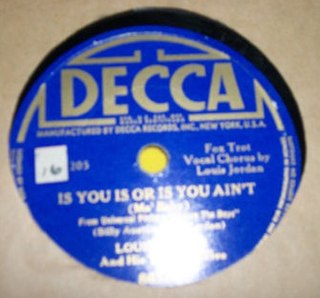
"Is You Is or Is You Ain't My Baby" is a song written by Louis Jordan and Billy Austin. The song's first recording, by Jordan, was made on October 4, 1943. It was released as the B-side of a single with "G.I. Jive" with the title "Is You Is or Is You Ain't ". The song reached No. 1 on the US folk/country charts, number two for three weeks on the pop chart, and number three on the R&B chart.

"Caldonia" is a jump blues song, first recorded in 1945 by Louis Jordan and his Tympany Five. Although credited to Fleecie Moore, his wife at the time, Jordan is the actual songwriter. The song was a hit for Jordan as well as several other musicians.
"Choo Choo Ch'Boogie" is a popular song written by Vaughn Horton, Denver Darling, and Milt Gabler.

Tympany Five was a successful and influential American rhythm and blues and jazz dance band founded by Louis Jordan in 1938. The group was composed of a horn section of three to five different pieces and also drums, double bass, guitar and piano.

Stormy Monday, also known as I'd Rather Drink Muddy Water, is the debut album of R&B singer Lou Rawls, released in 1962 on Capitol Records. Recorded in two sessions in February 1962, the album features a number of blues and jazz standards chosen by Rawls and backed by the Les McCann Trio. Stormy Monday was reissued in 1990 by Blue Note records.
"Let the Good Times Roll" is a jump blues song recorded in 1946 by Louis Jordan and his Tympany Five. A mid-tempo twelve-bar blues, the song became a blues standard and one of Jordan's best-known songs.
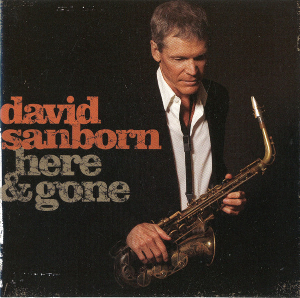
Here and Gone is an album by David Sanborn released in 2008 on Decca Records. It features guest stars such as Derek Trucks, Eric Clapton, Joss Stone and Sam Moore.

"Ration Blues" is a song written by Louis Jordan, Antonio Cosey, and Collenane Clark. It was performed by Louis Jordan and his Tympany Five, recorded in October 1943, and released on the Decca label. The "B" side of the record was "Deacon Jones".

"Ain't Nobody Here but Us Chickens" is a jump blues song, written by Alex Kramer and Joan Whitney. Louis Jordan and his Tympany Five recorded the song on June 26, 1946, and Decca Records released it on a 78 rpm record. It was added to the Grammy Hall of Fame in 2013.
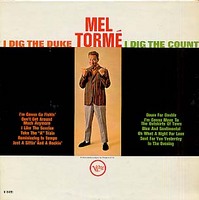
I Dig the Duke! I Dig the Count! is a 1962 album by Mel Tormé, recorded in tribute to Duke Ellington and Count Basie.
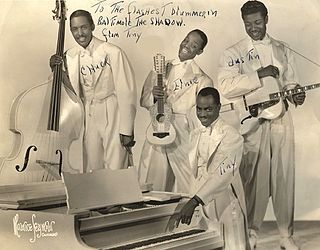
The Cats and the Fiddle was an African American singing group formed in 1937 in Chicago and active until 1951, releasing more than 30 gramophone sides during the period. Their instrumentation included a bass, tenor guitar, ukulele and Martin tiple, a 10-string ukulele-family instrument.
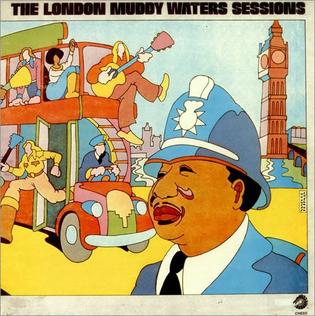
The London Muddy Waters Sessions is a studio album by Muddy Waters, released in 1972 on Chess Records. A follow-up to 1971's The London Howlin' Wolf Sessions, the concept was to combine American bluesmen with British blues/rock stars. The album was an attempt to capitalise on the increasing popularity of traditional blues music and blues artists in Britain.

"What's the Use of Getting Sober (When You Gonna Get Drunk Again)" is a song written by Busby Meyers, performed by Louis Jordan and his Tympany Five, recorded in July 1942, and released on the Decca label (catalog no. 8645). The "B" side of the record was "The Chicks I Pick Are Slender and Tender and Tall".

"Knock Me a Kiss" is a song written by Mike Jackson (music) and Andy Razaf (lyrics). It was performed by Louis Jordan and his Tympany Five, recorded in November 1941, and released on the Decca label. The B-side was "I'm Gonna Move to the Outskirts of Town".
















